Organisational Behaviour Report: Individual, Team, and Goals
VerifiedAdded on 2021/02/20
|18
|4846
|33
Report
AI Summary
This report provides a comprehensive analysis of organisational behaviour within A David & Co, a company involved in selling various food and related products. It examines the influence of organisational culture, politics, and power on individual and team behaviour and performance. The report delves into the Handy culture adopted by the company, discussing the impacts of power culture, task culture, person culture, and role culture. It also explores the positive and negative impacts of organisational politics. Furthermore, the report analyzes content and process theories of motivation, including Maslow's hierarchy of needs and Herzberg's two-factor theory, and discusses motivational techniques to enable effective goal achievement. The report concludes by examining the concepts and philosophies of organisational behaviour, offering insights into how companies can improve employee performance and achieve their objectives.
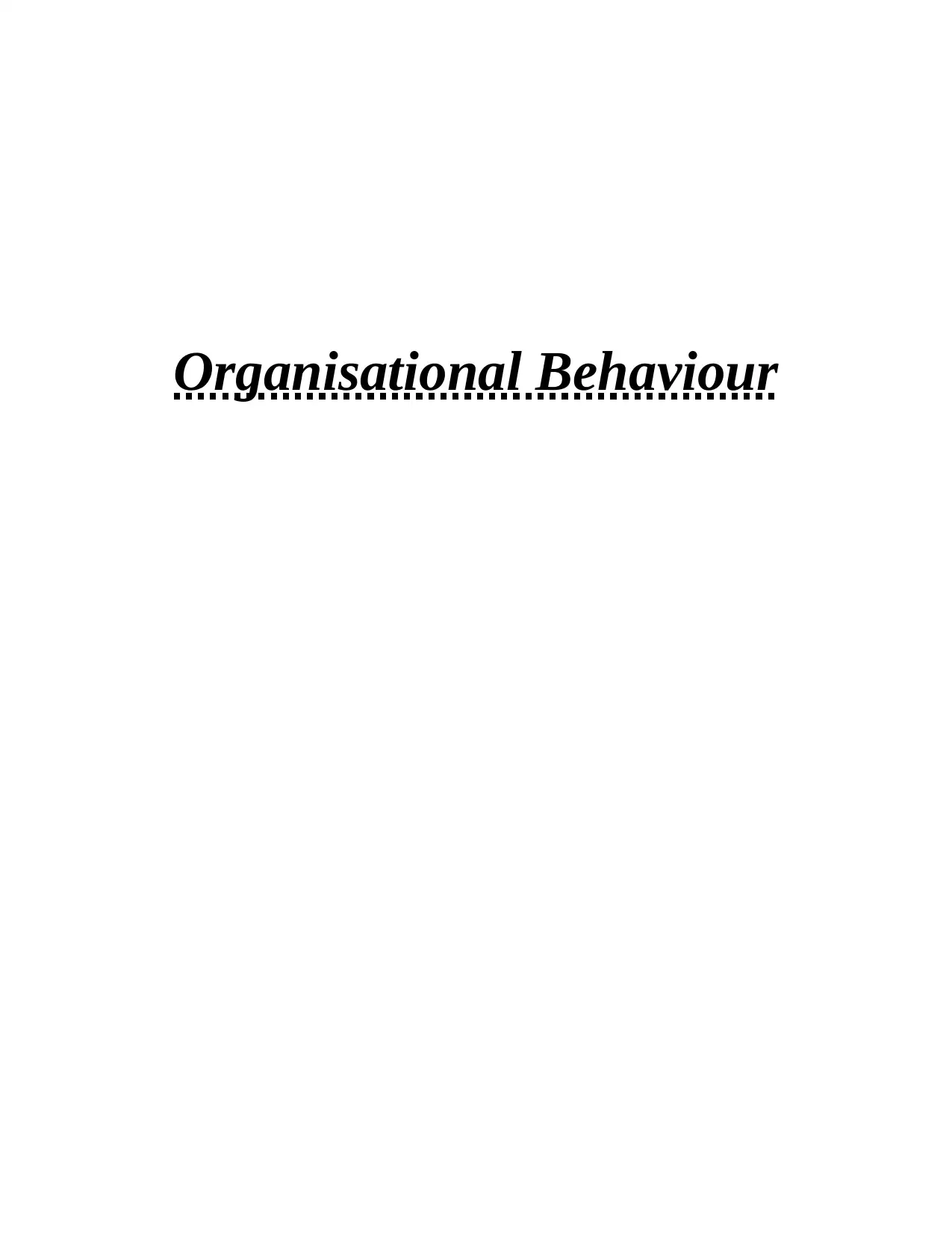
Organisational Behaviour
Paraphrase This Document
Need a fresh take? Get an instant paraphrase of this document with our AI Paraphraser
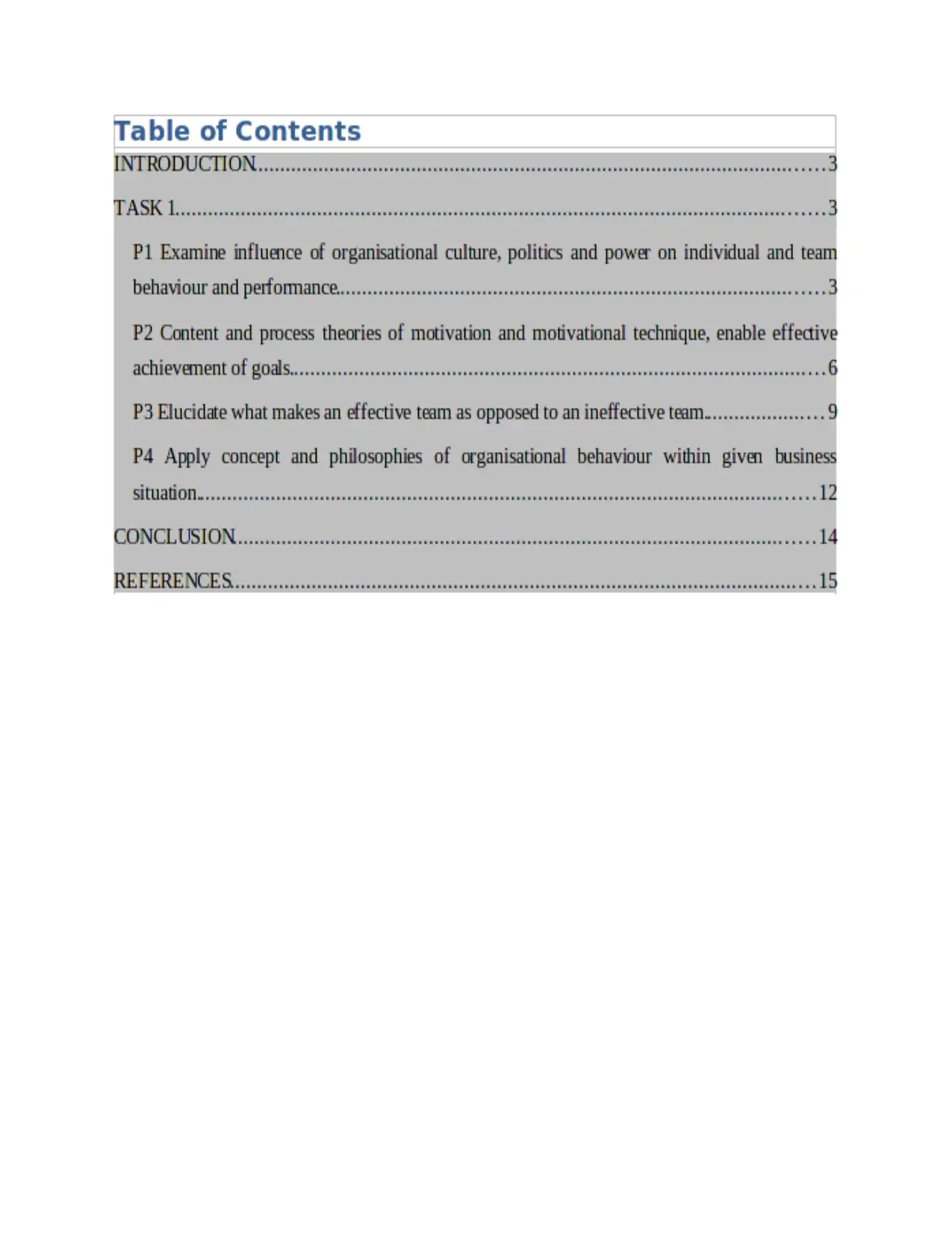
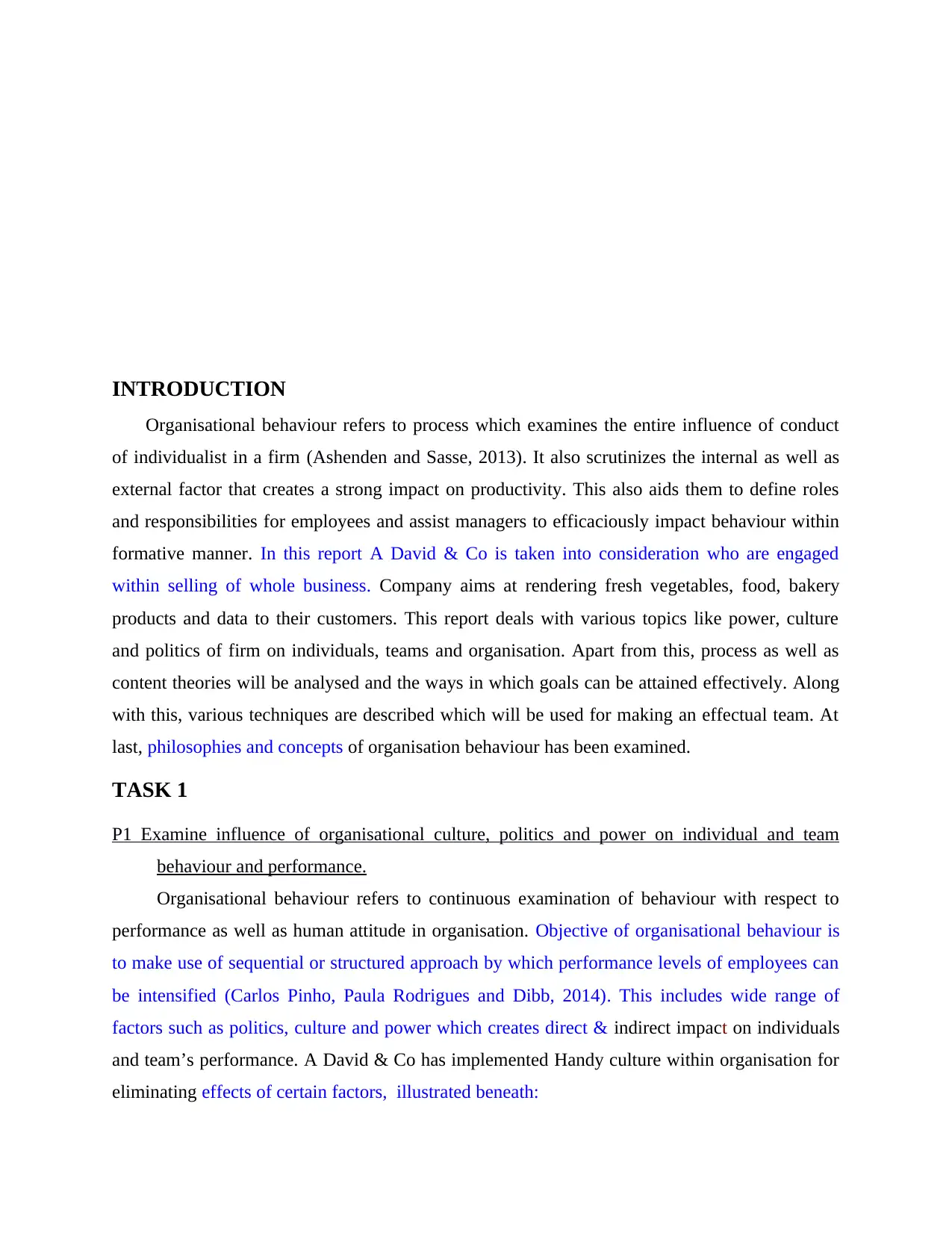
INTRODUCTION
Organisational behaviour refers to process which examines the entire influence of conduct
of individualist in a firm (Ashenden and Sasse, 2013). It also scrutinizes the internal as well as
external factor that creates a strong impact on productivity. This also aids them to define roles
and responsibilities for employees and assist managers to efficaciously impact behaviour within
formative manner. In this report A David & Co is taken into consideration who are engaged
within selling of whole business. Company aims at rendering fresh vegetables, food, bakery
products and data to their customers. This report deals with various topics like power, culture
and politics of firm on individuals, teams and organisation. Apart from this, process as well as
content theories will be analysed and the ways in which goals can be attained effectively. Along
with this, various techniques are described which will be used for making an effectual team. At
last, philosophies and concepts of organisation behaviour has been examined.
TASK 1
P1 Examine influence of organisational culture, politics and power on individual and team
behaviour and performance.
Organisational behaviour refers to continuous examination of behaviour with respect to
performance as well as human attitude in organisation. Objective of organisational behaviour is
to make use of sequential or structured approach by which performance levels of employees can
be intensified (Carlos Pinho, Paula Rodrigues and Dibb, 2014). This includes wide range of
factors such as politics, culture and power which creates direct & indirect impact on individuals
and team’s performance. A David & Co has implemented Handy culture within organisation for
eliminating effects of certain factors, illustrated beneath:
Organisational behaviour refers to process which examines the entire influence of conduct
of individualist in a firm (Ashenden and Sasse, 2013). It also scrutinizes the internal as well as
external factor that creates a strong impact on productivity. This also aids them to define roles
and responsibilities for employees and assist managers to efficaciously impact behaviour within
formative manner. In this report A David & Co is taken into consideration who are engaged
within selling of whole business. Company aims at rendering fresh vegetables, food, bakery
products and data to their customers. This report deals with various topics like power, culture
and politics of firm on individuals, teams and organisation. Apart from this, process as well as
content theories will be analysed and the ways in which goals can be attained effectively. Along
with this, various techniques are described which will be used for making an effectual team. At
last, philosophies and concepts of organisation behaviour has been examined.
TASK 1
P1 Examine influence of organisational culture, politics and power on individual and team
behaviour and performance.
Organisational behaviour refers to continuous examination of behaviour with respect to
performance as well as human attitude in organisation. Objective of organisational behaviour is
to make use of sequential or structured approach by which performance levels of employees can
be intensified (Carlos Pinho, Paula Rodrigues and Dibb, 2014). This includes wide range of
factors such as politics, culture and power which creates direct & indirect impact on individuals
and team’s performance. A David & Co has implemented Handy culture within organisation for
eliminating effects of certain factors, illustrated beneath:
⊘ This is a preview!⊘
Do you want full access?
Subscribe today to unlock all pages.

Trusted by 1+ million students worldwide
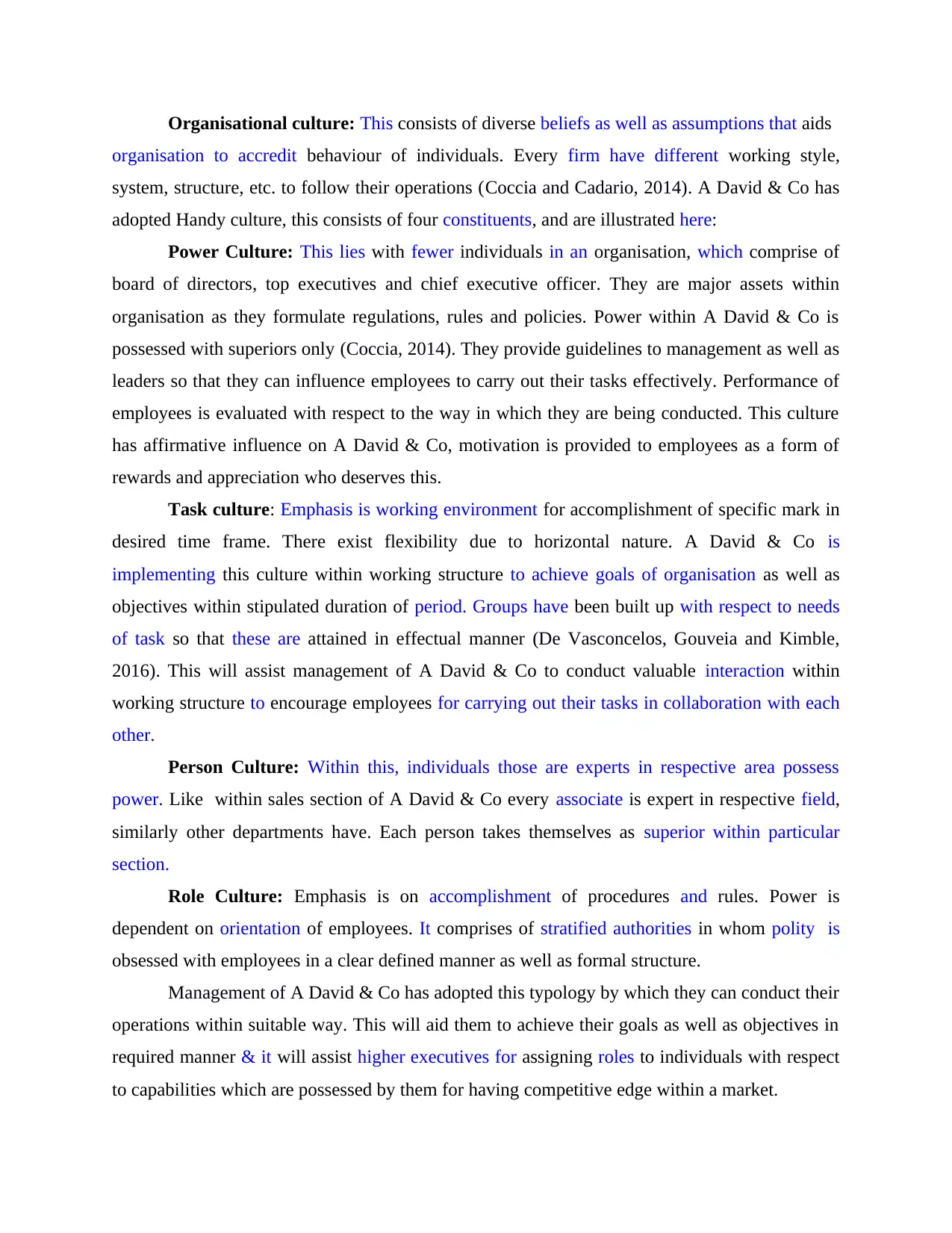
Organisational culture: This consists of diverse beliefs as well as assumptions that aids
organisation to accredit behaviour of individuals. Every firm have different working style,
system, structure, etc. to follow their operations (Coccia and Cadario, 2014). A David & Co has
adopted Handy culture, this consists of four constituents, and are illustrated here:
Power Culture: This lies with fewer individuals in an organisation, which comprise of
board of directors, top executives and chief executive officer. They are major assets within
organisation as they formulate regulations, rules and policies. Power within A David & Co is
possessed with superiors only (Coccia, 2014). They provide guidelines to management as well as
leaders so that they can influence employees to carry out their tasks effectively. Performance of
employees is evaluated with respect to the way in which they are being conducted. This culture
has affirmative influence on A David & Co, motivation is provided to employees as a form of
rewards and appreciation who deserves this.
Task culture: Emphasis is working environment for accomplishment of specific mark in
desired time frame. There exist flexibility due to horizontal nature. A David & Co is
implementing this culture within working structure to achieve goals of organisation as well as
objectives within stipulated duration of period. Groups have been built up with respect to needs
of task so that these are attained in effectual manner (De Vasconcelos, Gouveia and Kimble,
2016). This will assist management of A David & Co to conduct valuable interaction within
working structure to encourage employees for carrying out their tasks in collaboration with each
other.
Person Culture: Within this, individuals those are experts in respective area possess
power. Like within sales section of A David & Co every associate is expert in respective field,
similarly other departments have. Each person takes themselves as superior within particular
section.
Role Culture: Emphasis is on accomplishment of procedures and rules. Power is
dependent on orientation of employees. It comprises of stratified authorities in whom polity is
obsessed with employees in a clear defined manner as well as formal structure.
Management of A David & Co has adopted this typology by which they can conduct their
operations within suitable way. This will aid them to achieve their goals as well as objectives in
required manner & it will assist higher executives for assigning roles to individuals with respect
to capabilities which are possessed by them for having competitive edge within a market.
organisation to accredit behaviour of individuals. Every firm have different working style,
system, structure, etc. to follow their operations (Coccia and Cadario, 2014). A David & Co has
adopted Handy culture, this consists of four constituents, and are illustrated here:
Power Culture: This lies with fewer individuals in an organisation, which comprise of
board of directors, top executives and chief executive officer. They are major assets within
organisation as they formulate regulations, rules and policies. Power within A David & Co is
possessed with superiors only (Coccia, 2014). They provide guidelines to management as well as
leaders so that they can influence employees to carry out their tasks effectively. Performance of
employees is evaluated with respect to the way in which they are being conducted. This culture
has affirmative influence on A David & Co, motivation is provided to employees as a form of
rewards and appreciation who deserves this.
Task culture: Emphasis is working environment for accomplishment of specific mark in
desired time frame. There exist flexibility due to horizontal nature. A David & Co is
implementing this culture within working structure to achieve goals of organisation as well as
objectives within stipulated duration of period. Groups have been built up with respect to needs
of task so that these are attained in effectual manner (De Vasconcelos, Gouveia and Kimble,
2016). This will assist management of A David & Co to conduct valuable interaction within
working structure to encourage employees for carrying out their tasks in collaboration with each
other.
Person Culture: Within this, individuals those are experts in respective area possess
power. Like within sales section of A David & Co every associate is expert in respective field,
similarly other departments have. Each person takes themselves as superior within particular
section.
Role Culture: Emphasis is on accomplishment of procedures and rules. Power is
dependent on orientation of employees. It comprises of stratified authorities in whom polity is
obsessed with employees in a clear defined manner as well as formal structure.
Management of A David & Co has adopted this typology by which they can conduct their
operations within suitable way. This will aid them to achieve their goals as well as objectives in
required manner & it will assist higher executives for assigning roles to individuals with respect
to capabilities which are possessed by them for having competitive edge within a market.
Paraphrase This Document
Need a fresh take? Get an instant paraphrase of this document with our AI Paraphraser
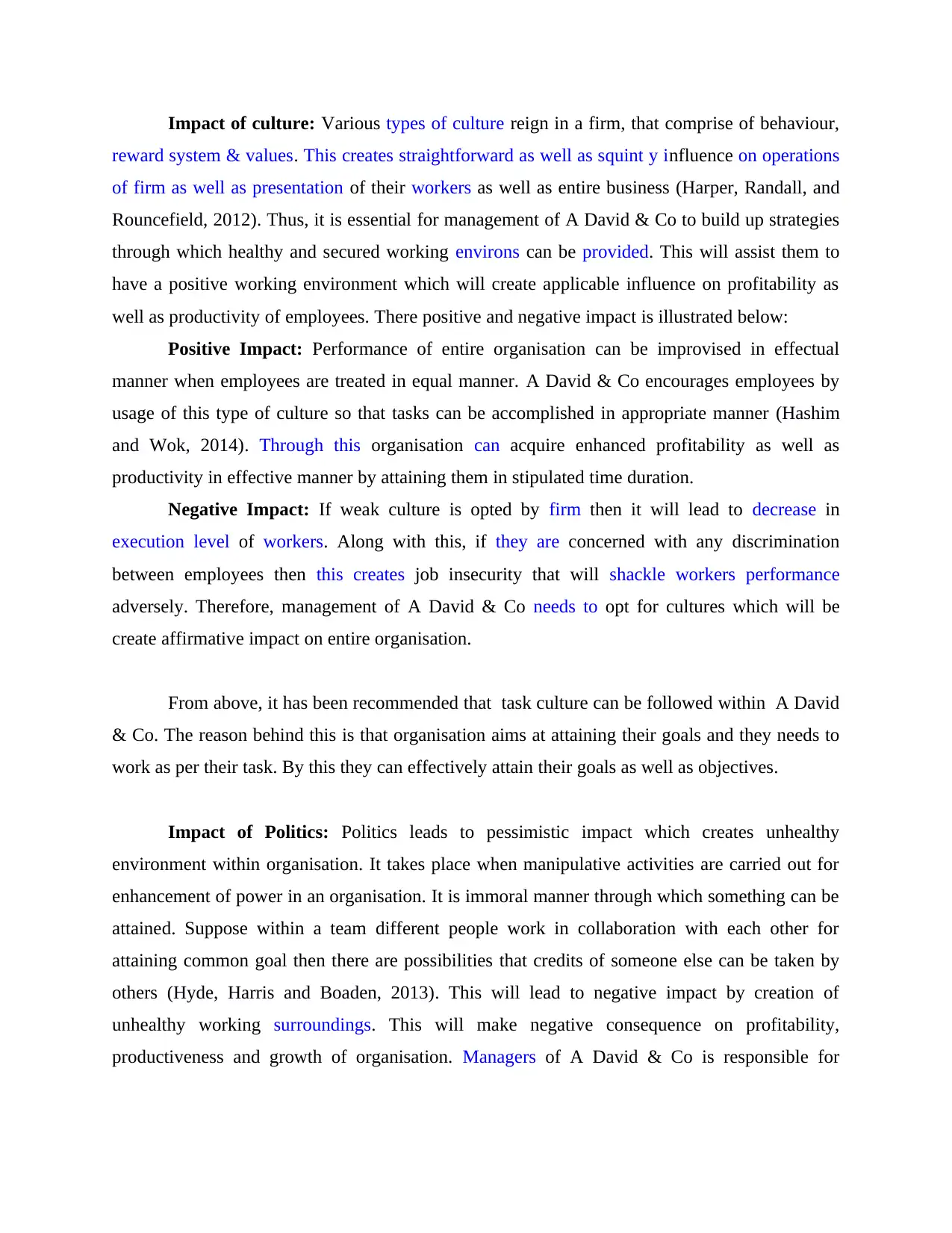
Impact of culture: Various types of culture reign in a firm, that comprise of behaviour,
reward system & values. This creates straightforward as well as squint y influence on operations
of firm as well as presentation of their workers as well as entire business (Harper, Randall, and
Rouncefield, 2012). Thus, it is essential for management of A David & Co to build up strategies
through which healthy and secured working environs can be provided. This will assist them to
have a positive working environment which will create applicable influence on profitability as
well as productivity of employees. There positive and negative impact is illustrated below:
Positive Impact: Performance of entire organisation can be improvised in effectual
manner when employees are treated in equal manner. A David & Co encourages employees by
usage of this type of culture so that tasks can be accomplished in appropriate manner (Hashim
and Wok, 2014). Through this organisation can acquire enhanced profitability as well as
productivity in effective manner by attaining them in stipulated time duration.
Negative Impact: If weak culture is opted by firm then it will lead to decrease in
execution level of workers. Along with this, if they are concerned with any discrimination
between employees then this creates job insecurity that will shackle workers performance
adversely. Therefore, management of A David & Co needs to opt for cultures which will be
create affirmative impact on entire organisation.
From above, it has been recommended that task culture can be followed within A David
& Co. The reason behind this is that organisation aims at attaining their goals and they needs to
work as per their task. By this they can effectively attain their goals as well as objectives.
Impact of Politics: Politics leads to pessimistic impact which creates unhealthy
environment within organisation. It takes place when manipulative activities are carried out for
enhancement of power in an organisation. It is immoral manner through which something can be
attained. Suppose within a team different people work in collaboration with each other for
attaining common goal then there are possibilities that credits of someone else can be taken by
others (Hyde, Harris and Boaden, 2013). This will lead to negative impact by creation of
unhealthy working surroundings. This will make negative consequence on profitability,
productiveness and growth of organisation. Managers of A David & Co is responsible for
reward system & values. This creates straightforward as well as squint y influence on operations
of firm as well as presentation of their workers as well as entire business (Harper, Randall, and
Rouncefield, 2012). Thus, it is essential for management of A David & Co to build up strategies
through which healthy and secured working environs can be provided. This will assist them to
have a positive working environment which will create applicable influence on profitability as
well as productivity of employees. There positive and negative impact is illustrated below:
Positive Impact: Performance of entire organisation can be improvised in effectual
manner when employees are treated in equal manner. A David & Co encourages employees by
usage of this type of culture so that tasks can be accomplished in appropriate manner (Hashim
and Wok, 2014). Through this organisation can acquire enhanced profitability as well as
productivity in effective manner by attaining them in stipulated time duration.
Negative Impact: If weak culture is opted by firm then it will lead to decrease in
execution level of workers. Along with this, if they are concerned with any discrimination
between employees then this creates job insecurity that will shackle workers performance
adversely. Therefore, management of A David & Co needs to opt for cultures which will be
create affirmative impact on entire organisation.
From above, it has been recommended that task culture can be followed within A David
& Co. The reason behind this is that organisation aims at attaining their goals and they needs to
work as per their task. By this they can effectively attain their goals as well as objectives.
Impact of Politics: Politics leads to pessimistic impact which creates unhealthy
environment within organisation. It takes place when manipulative activities are carried out for
enhancement of power in an organisation. It is immoral manner through which something can be
attained. Suppose within a team different people work in collaboration with each other for
attaining common goal then there are possibilities that credits of someone else can be taken by
others (Hyde, Harris and Boaden, 2013). This will lead to negative impact by creation of
unhealthy working surroundings. This will make negative consequence on profitability,
productiveness and growth of organisation. Managers of A David & Co is responsible for
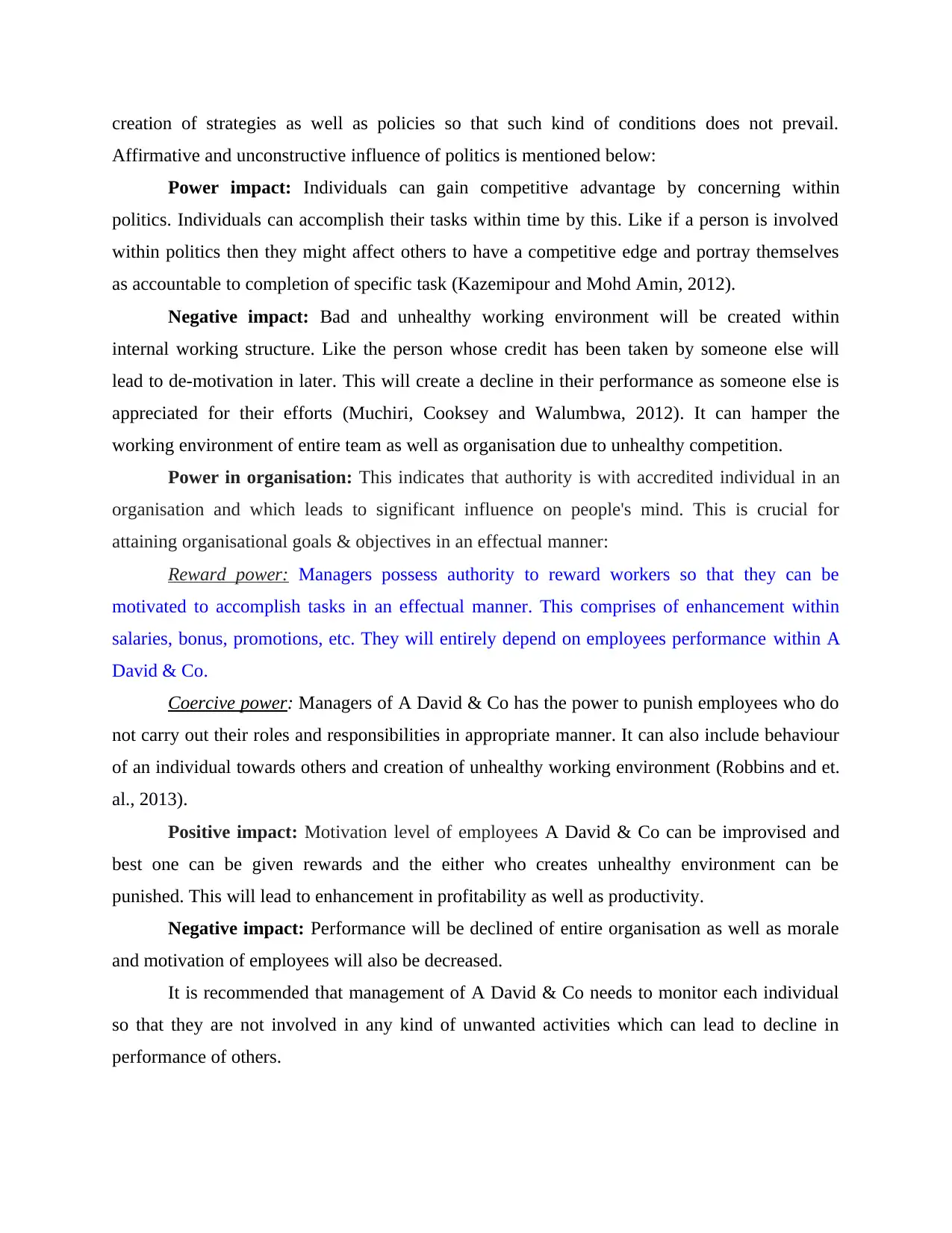
creation of strategies as well as policies so that such kind of conditions does not prevail.
Affirmative and unconstructive influence of politics is mentioned below:
Power impact: Individuals can gain competitive advantage by concerning within
politics. Individuals can accomplish their tasks within time by this. Like if a person is involved
within politics then they might affect others to have a competitive edge and portray themselves
as accountable to completion of specific task (Kazemipour and Mohd Amin, 2012).
Negative impact: Bad and unhealthy working environment will be created within
internal working structure. Like the person whose credit has been taken by someone else will
lead to de-motivation in later. This will create a decline in their performance as someone else is
appreciated for their efforts (Muchiri, Cooksey and Walumbwa, 2012). It can hamper the
working environment of entire team as well as organisation due to unhealthy competition.
Power in organisation: This indicates that authority is with accredited individual in an
organisation and which leads to significant influence on people's mind. This is crucial for
attaining organisational goals & objectives in an effectual manner:
Reward power: Managers possess authority to reward workers so that they can be
motivated to accomplish tasks in an effectual manner. This comprises of enhancement within
salaries, bonus, promotions, etc. They will entirely depend on employees performance within A
David & Co.
Coercive power: Managers of A David & Co has the power to punish employees who do
not carry out their roles and responsibilities in appropriate manner. It can also include behaviour
of an individual towards others and creation of unhealthy working environment (Robbins and et.
al., 2013).
Positive impact: Motivation level of employees A David & Co can be improvised and
best one can be given rewards and the either who creates unhealthy environment can be
punished. This will lead to enhancement in profitability as well as productivity.
Negative impact: Performance will be declined of entire organisation as well as morale
and motivation of employees will also be decreased.
It is recommended that management of A David & Co needs to monitor each individual
so that they are not involved in any kind of unwanted activities which can lead to decline in
performance of others.
Affirmative and unconstructive influence of politics is mentioned below:
Power impact: Individuals can gain competitive advantage by concerning within
politics. Individuals can accomplish their tasks within time by this. Like if a person is involved
within politics then they might affect others to have a competitive edge and portray themselves
as accountable to completion of specific task (Kazemipour and Mohd Amin, 2012).
Negative impact: Bad and unhealthy working environment will be created within
internal working structure. Like the person whose credit has been taken by someone else will
lead to de-motivation in later. This will create a decline in their performance as someone else is
appreciated for their efforts (Muchiri, Cooksey and Walumbwa, 2012). It can hamper the
working environment of entire team as well as organisation due to unhealthy competition.
Power in organisation: This indicates that authority is with accredited individual in an
organisation and which leads to significant influence on people's mind. This is crucial for
attaining organisational goals & objectives in an effectual manner:
Reward power: Managers possess authority to reward workers so that they can be
motivated to accomplish tasks in an effectual manner. This comprises of enhancement within
salaries, bonus, promotions, etc. They will entirely depend on employees performance within A
David & Co.
Coercive power: Managers of A David & Co has the power to punish employees who do
not carry out their roles and responsibilities in appropriate manner. It can also include behaviour
of an individual towards others and creation of unhealthy working environment (Robbins and et.
al., 2013).
Positive impact: Motivation level of employees A David & Co can be improvised and
best one can be given rewards and the either who creates unhealthy environment can be
punished. This will lead to enhancement in profitability as well as productivity.
Negative impact: Performance will be declined of entire organisation as well as morale
and motivation of employees will also be decreased.
It is recommended that management of A David & Co needs to monitor each individual
so that they are not involved in any kind of unwanted activities which can lead to decline in
performance of others.
⊘ This is a preview!⊘
Do you want full access?
Subscribe today to unlock all pages.

Trusted by 1+ million students worldwide
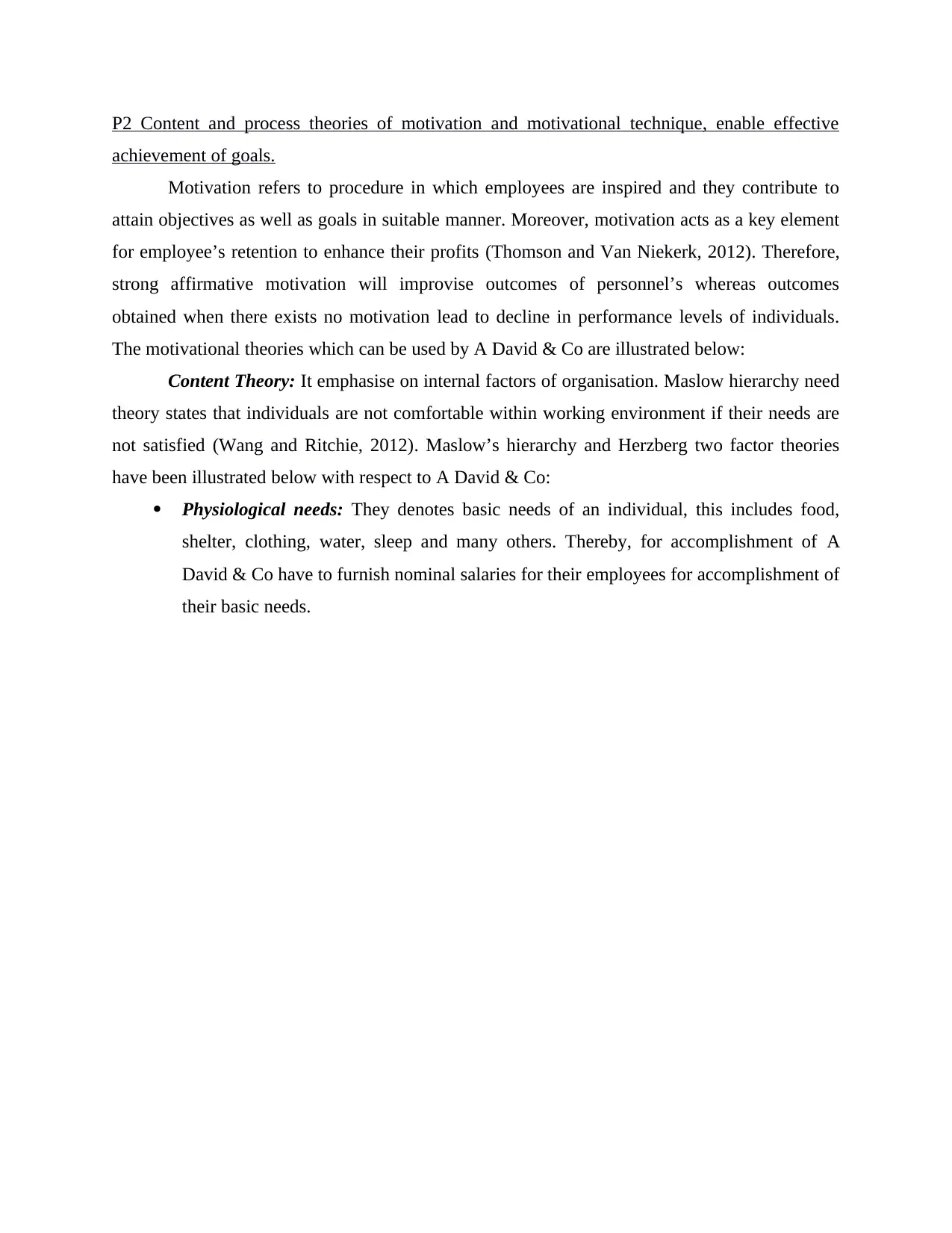
P2 Content and process theories of motivation and motivational technique, enable effective
achievement of goals.
Motivation refers to procedure in which employees are inspired and they contribute to
attain objectives as well as goals in suitable manner. Moreover, motivation acts as a key element
for employee’s retention to enhance their profits (Thomson and Van Niekerk, 2012). Therefore,
strong affirmative motivation will improvise outcomes of personnel’s whereas outcomes
obtained when there exists no motivation lead to decline in performance levels of individuals.
The motivational theories which can be used by A David & Co are illustrated below:
Content Theory: It emphasise on internal factors of organisation. Maslow hierarchy need
theory states that individuals are not comfortable within working environment if their needs are
not satisfied (Wang and Ritchie, 2012). Maslow’s hierarchy and Herzberg two factor theories
have been illustrated below with respect to A David & Co:
Physiological needs: They denotes basic needs of an individual, this includes food,
shelter, clothing, water, sleep and many others. Thereby, for accomplishment of A
David & Co have to furnish nominal salaries for their employees for accomplishment of
their basic needs.
achievement of goals.
Motivation refers to procedure in which employees are inspired and they contribute to
attain objectives as well as goals in suitable manner. Moreover, motivation acts as a key element
for employee’s retention to enhance their profits (Thomson and Van Niekerk, 2012). Therefore,
strong affirmative motivation will improvise outcomes of personnel’s whereas outcomes
obtained when there exists no motivation lead to decline in performance levels of individuals.
The motivational theories which can be used by A David & Co are illustrated below:
Content Theory: It emphasise on internal factors of organisation. Maslow hierarchy need
theory states that individuals are not comfortable within working environment if their needs are
not satisfied (Wang and Ritchie, 2012). Maslow’s hierarchy and Herzberg two factor theories
have been illustrated below with respect to A David & Co:
Physiological needs: They denotes basic needs of an individual, this includes food,
shelter, clothing, water, sleep and many others. Thereby, for accomplishment of A
David & Co have to furnish nominal salaries for their employees for accomplishment of
their basic needs.
Paraphrase This Document
Need a fresh take? Get an instant paraphrase of this document with our AI Paraphraser
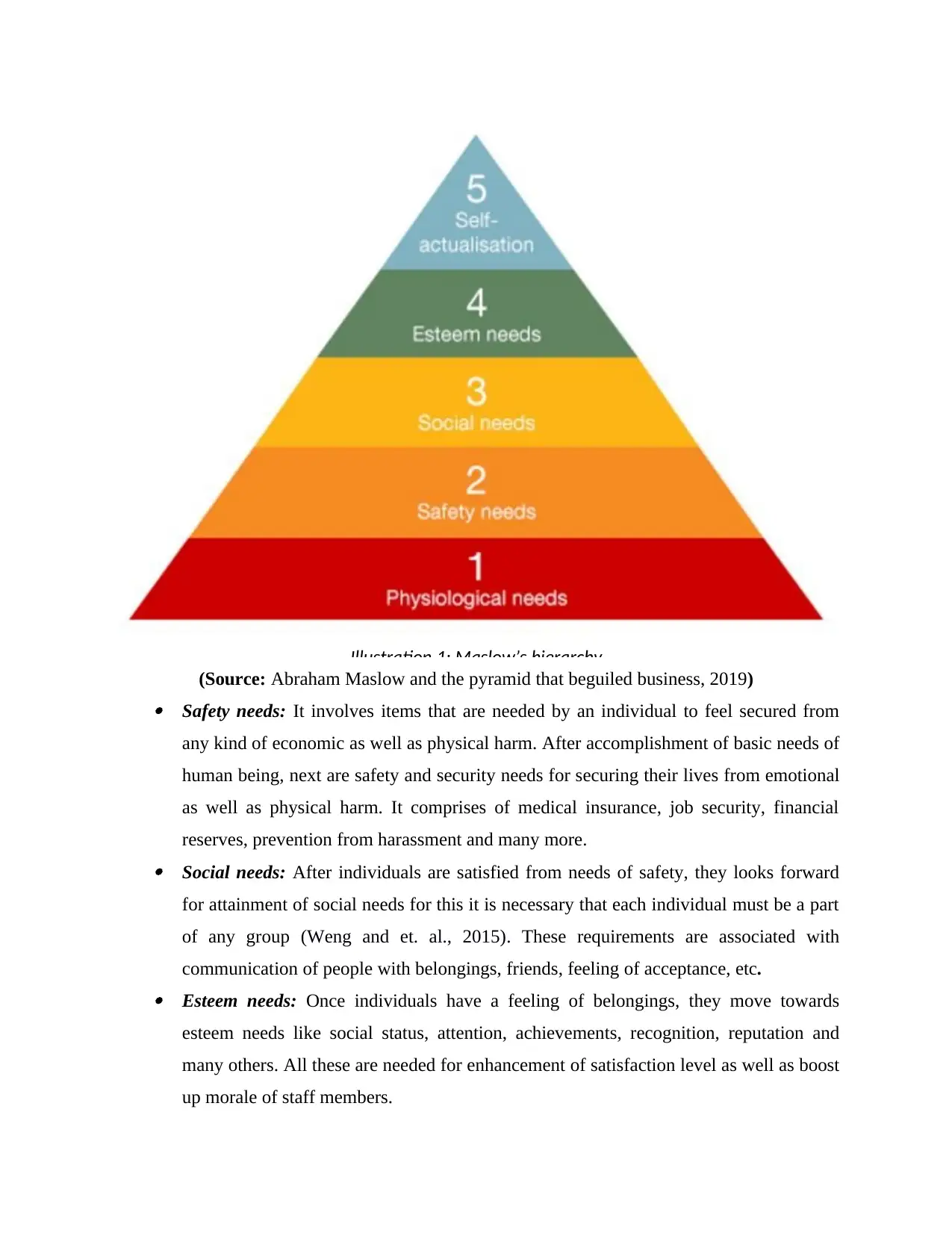
(Source: Abraham Maslow and the pyramid that beguiled business, 2019) Safety needs: It involves items that are needed by an individual to feel secured from
any kind of economic as well as physical harm. After accomplishment of basic needs of
human being, next are safety and security needs for securing their lives from emotional
as well as physical harm. It comprises of medical insurance, job security, financial
reserves, prevention from harassment and many more. Social needs: After individuals are satisfied from needs of safety, they looks forward
for attainment of social needs for this it is necessary that each individual must be a part
of any group (Weng and et. al., 2015). These requirements are associated with
communication of people with belongings, friends, feeling of acceptance, etc. Esteem needs: Once individuals have a feeling of belongings, they move towards
esteem needs like social status, attention, achievements, recognition, reputation and
many others. All these are needed for enhancement of satisfaction level as well as boost
up morale of staff members.
Illustration 1: Maslow’s hierarchy
any kind of economic as well as physical harm. After accomplishment of basic needs of
human being, next are safety and security needs for securing their lives from emotional
as well as physical harm. It comprises of medical insurance, job security, financial
reserves, prevention from harassment and many more. Social needs: After individuals are satisfied from needs of safety, they looks forward
for attainment of social needs for this it is necessary that each individual must be a part
of any group (Weng and et. al., 2015). These requirements are associated with
communication of people with belongings, friends, feeling of acceptance, etc. Esteem needs: Once individuals have a feeling of belongings, they move towards
esteem needs like social status, attention, achievements, recognition, reputation and
many others. All these are needed for enhancement of satisfaction level as well as boost
up morale of staff members.
Illustration 1: Maslow’s hierarchy
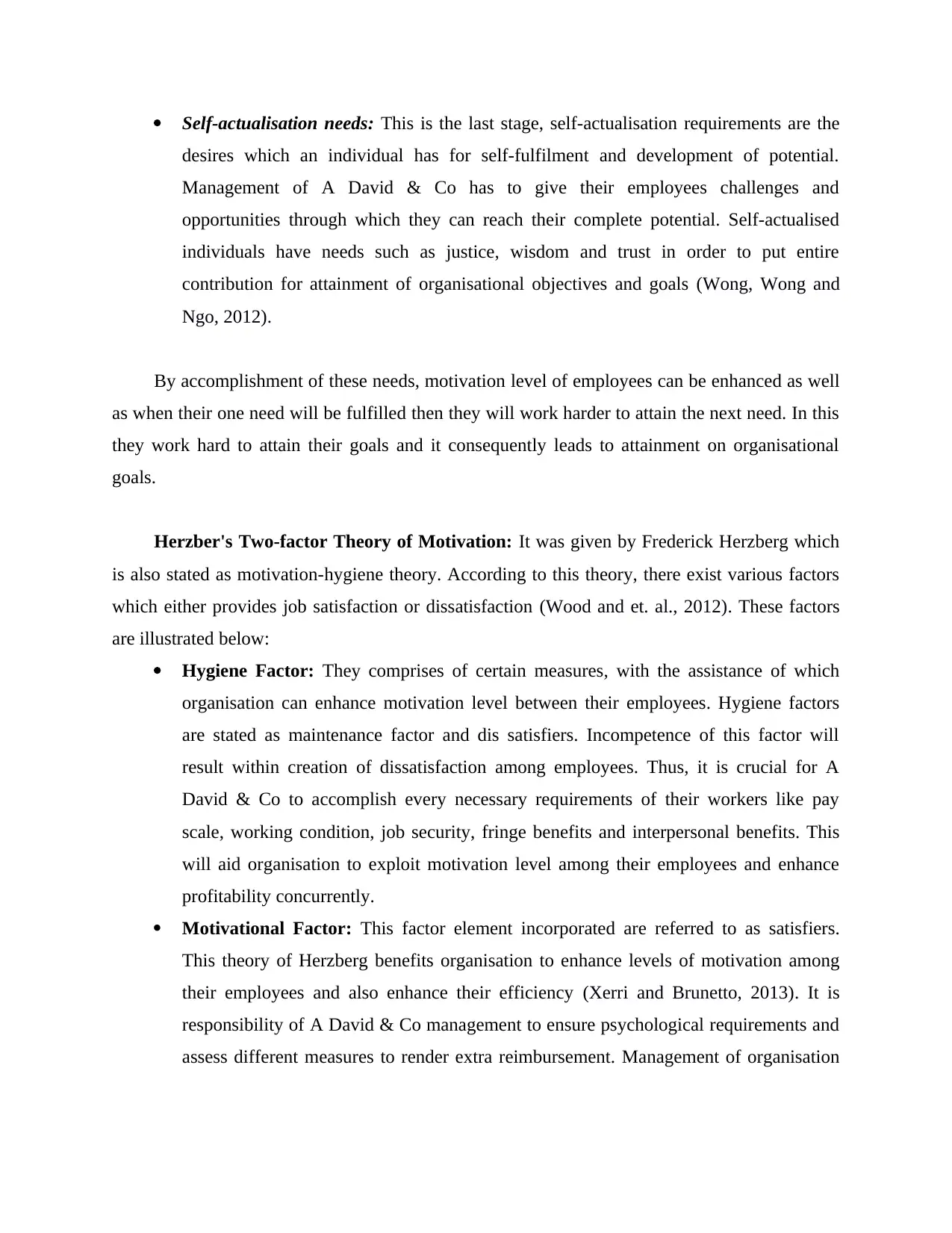
Self-actualisation needs: This is the last stage, self-actualisation requirements are the
desires which an individual has for self-fulfilment and development of potential.
Management of A David & Co has to give their employees challenges and
opportunities through which they can reach their complete potential. Self-actualised
individuals have needs such as justice, wisdom and trust in order to put entire
contribution for attainment of organisational objectives and goals (Wong, Wong and
Ngo, 2012).
By accomplishment of these needs, motivation level of employees can be enhanced as well
as when their one need will be fulfilled then they will work harder to attain the next need. In this
they work hard to attain their goals and it consequently leads to attainment on organisational
goals.
Herzber's Two-factor Theory of Motivation: It was given by Frederick Herzberg which
is also stated as motivation-hygiene theory. According to this theory, there exist various factors
which either provides job satisfaction or dissatisfaction (Wood and et. al., 2012). These factors
are illustrated below:
Hygiene Factor: They comprises of certain measures, with the assistance of which
organisation can enhance motivation level between their employees. Hygiene factors
are stated as maintenance factor and dis satisfiers. Incompetence of this factor will
result within creation of dissatisfaction among employees. Thus, it is crucial for A
David & Co to accomplish every necessary requirements of their workers like pay
scale, working condition, job security, fringe benefits and interpersonal benefits. This
will aid organisation to exploit motivation level among their employees and enhance
profitability concurrently.
Motivational Factor: This factor element incorporated are referred to as satisfiers.
This theory of Herzberg benefits organisation to enhance levels of motivation among
their employees and also enhance their efficiency (Xerri and Brunetto, 2013). It is
responsibility of A David & Co management to ensure psychological requirements and
assess different measures to render extra reimbursement. Management of organisation
desires which an individual has for self-fulfilment and development of potential.
Management of A David & Co has to give their employees challenges and
opportunities through which they can reach their complete potential. Self-actualised
individuals have needs such as justice, wisdom and trust in order to put entire
contribution for attainment of organisational objectives and goals (Wong, Wong and
Ngo, 2012).
By accomplishment of these needs, motivation level of employees can be enhanced as well
as when their one need will be fulfilled then they will work harder to attain the next need. In this
they work hard to attain their goals and it consequently leads to attainment on organisational
goals.
Herzber's Two-factor Theory of Motivation: It was given by Frederick Herzberg which
is also stated as motivation-hygiene theory. According to this theory, there exist various factors
which either provides job satisfaction or dissatisfaction (Wood and et. al., 2012). These factors
are illustrated below:
Hygiene Factor: They comprises of certain measures, with the assistance of which
organisation can enhance motivation level between their employees. Hygiene factors
are stated as maintenance factor and dis satisfiers. Incompetence of this factor will
result within creation of dissatisfaction among employees. Thus, it is crucial for A
David & Co to accomplish every necessary requirements of their workers like pay
scale, working condition, job security, fringe benefits and interpersonal benefits. This
will aid organisation to exploit motivation level among their employees and enhance
profitability concurrently.
Motivational Factor: This factor element incorporated are referred to as satisfiers.
This theory of Herzberg benefits organisation to enhance levels of motivation among
their employees and also enhance their efficiency (Xerri and Brunetto, 2013). It is
responsibility of A David & Co management to ensure psychological requirements and
assess different measures to render extra reimbursement. Management of organisation
⊘ This is a preview!⊘
Do you want full access?
Subscribe today to unlock all pages.

Trusted by 1+ million students worldwide
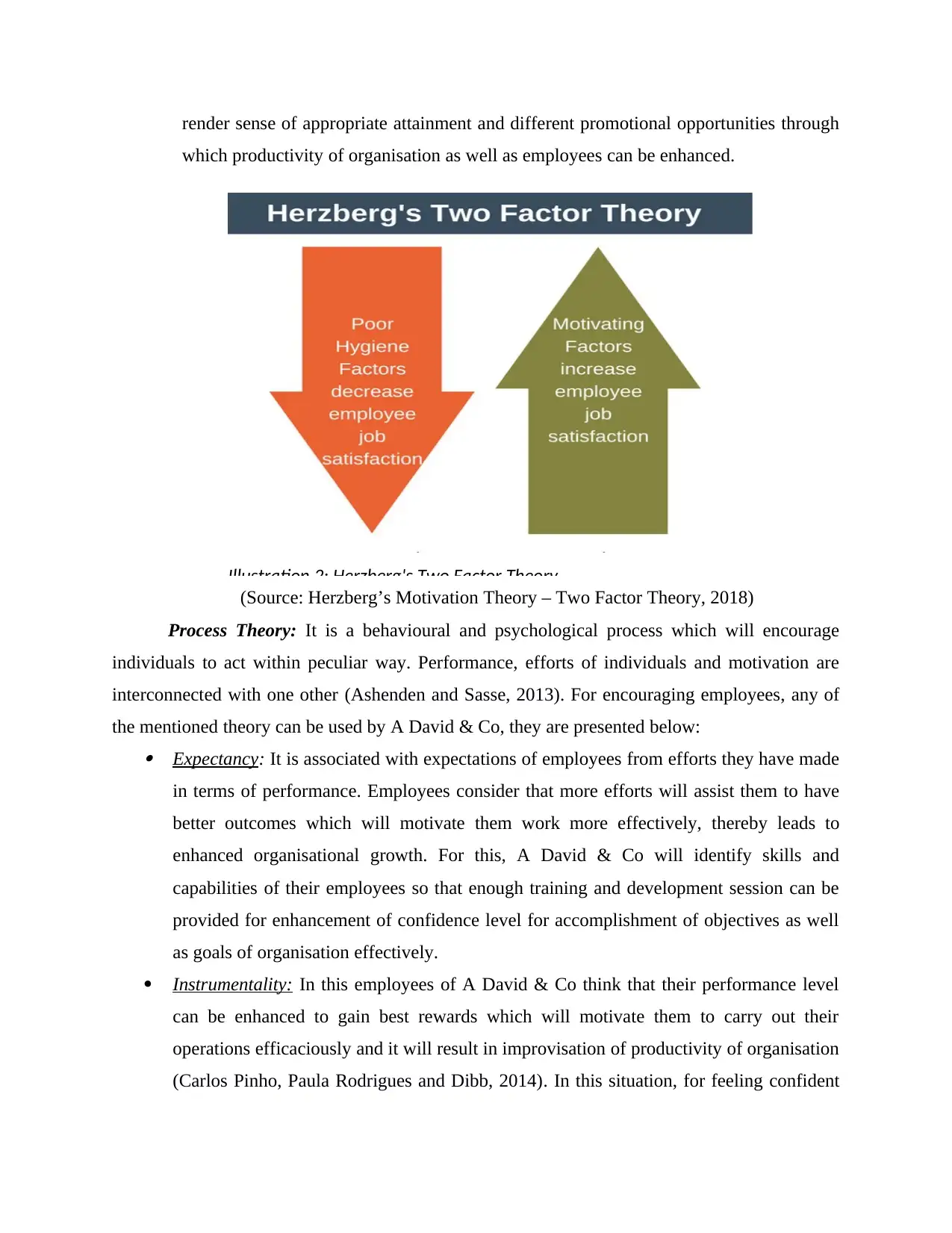
render sense of appropriate attainment and different promotional opportunities through
which productivity of organisation as well as employees can be enhanced.
(Source: Herzberg’s Motivation Theory – Two Factor Theory, 2018)
Process Theory: It is a behavioural and psychological process which will encourage
individuals to act within peculiar way. Performance, efforts of individuals and motivation are
interconnected with one other (Ashenden and Sasse, 2013). For encouraging employees, any of
the mentioned theory can be used by A David & Co, they are presented below: Expectancy: It is associated with expectations of employees from efforts they have made
in terms of performance. Employees consider that more efforts will assist them to have
better outcomes which will motivate them work more effectively, thereby leads to
enhanced organisational growth. For this, A David & Co will identify skills and
capabilities of their employees so that enough training and development session can be
provided for enhancement of confidence level for accomplishment of objectives as well
as goals of organisation effectively.
Instrumentality: In this employees of A David & Co think that their performance level
can be enhanced to gain best rewards which will motivate them to carry out their
operations efficaciously and it will result in improvisation of productivity of organisation
(Carlos Pinho, Paula Rodrigues and Dibb, 2014). In this situation, for feeling confident
Illustration 2: Herzberg's Two Factor Theory
which productivity of organisation as well as employees can be enhanced.
(Source: Herzberg’s Motivation Theory – Two Factor Theory, 2018)
Process Theory: It is a behavioural and psychological process which will encourage
individuals to act within peculiar way. Performance, efforts of individuals and motivation are
interconnected with one other (Ashenden and Sasse, 2013). For encouraging employees, any of
the mentioned theory can be used by A David & Co, they are presented below: Expectancy: It is associated with expectations of employees from efforts they have made
in terms of performance. Employees consider that more efforts will assist them to have
better outcomes which will motivate them work more effectively, thereby leads to
enhanced organisational growth. For this, A David & Co will identify skills and
capabilities of their employees so that enough training and development session can be
provided for enhancement of confidence level for accomplishment of objectives as well
as goals of organisation effectively.
Instrumentality: In this employees of A David & Co think that their performance level
can be enhanced to gain best rewards which will motivate them to carry out their
operations efficaciously and it will result in improvisation of productivity of organisation
(Carlos Pinho, Paula Rodrigues and Dibb, 2014). In this situation, for feeling confident
Illustration 2: Herzberg's Two Factor Theory
Paraphrase This Document
Need a fresh take? Get an instant paraphrase of this document with our AI Paraphraser
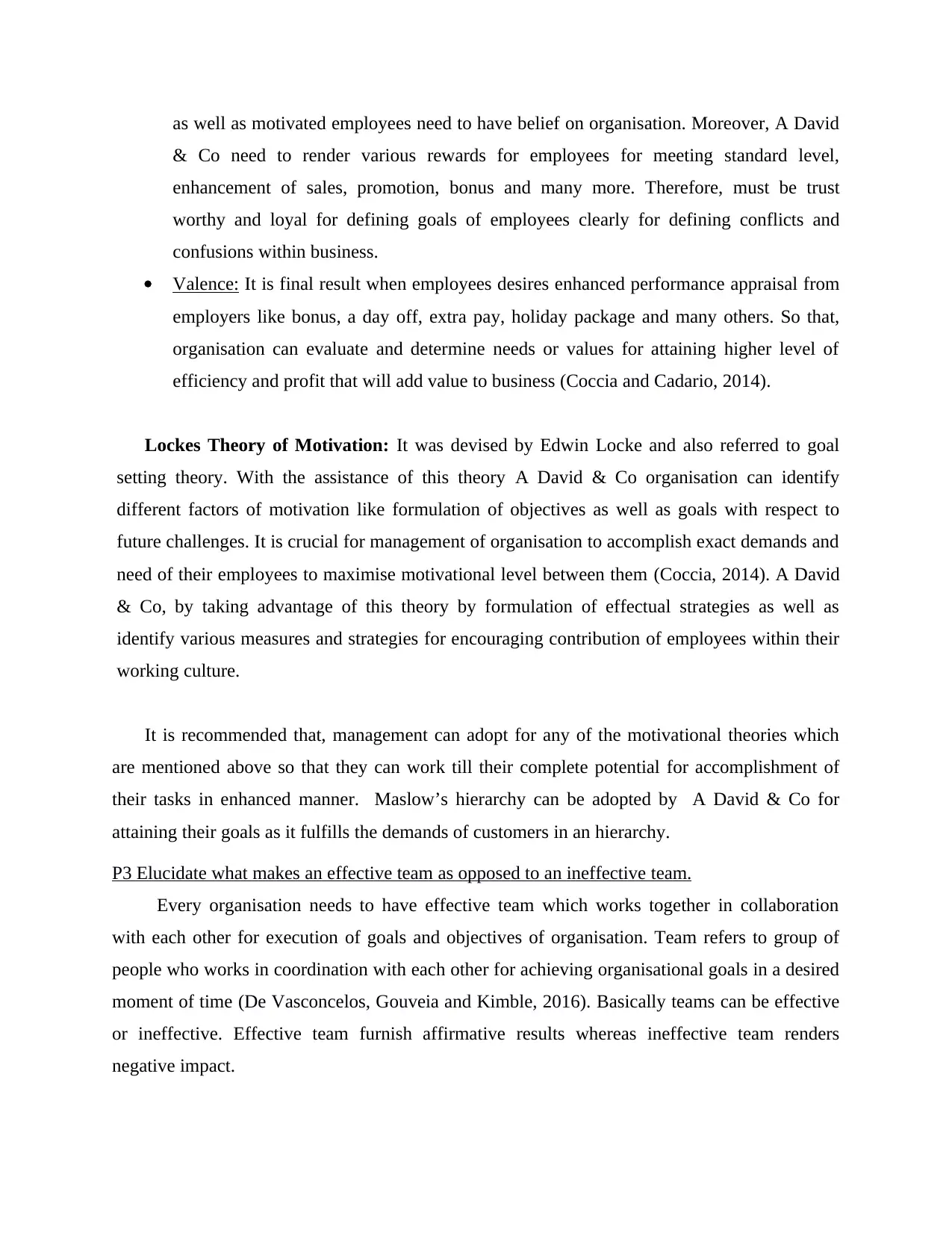
as well as motivated employees need to have belief on organisation. Moreover, A David
& Co need to render various rewards for employees for meeting standard level,
enhancement of sales, promotion, bonus and many more. Therefore, must be trust
worthy and loyal for defining goals of employees clearly for defining conflicts and
confusions within business.
Valence: It is final result when employees desires enhanced performance appraisal from
employers like bonus, a day off, extra pay, holiday package and many others. So that,
organisation can evaluate and determine needs or values for attaining higher level of
efficiency and profit that will add value to business (Coccia and Cadario, 2014).
Lockes Theory of Motivation: It was devised by Edwin Locke and also referred to goal
setting theory. With the assistance of this theory A David & Co organisation can identify
different factors of motivation like formulation of objectives as well as goals with respect to
future challenges. It is crucial for management of organisation to accomplish exact demands and
need of their employees to maximise motivational level between them (Coccia, 2014). A David
& Co, by taking advantage of this theory by formulation of effectual strategies as well as
identify various measures and strategies for encouraging contribution of employees within their
working culture.
It is recommended that, management can adopt for any of the motivational theories which
are mentioned above so that they can work till their complete potential for accomplishment of
their tasks in enhanced manner. Maslow’s hierarchy can be adopted by A David & Co for
attaining their goals as it fulfills the demands of customers in an hierarchy.
P3 Elucidate what makes an effective team as opposed to an ineffective team.
Every organisation needs to have effective team which works together in collaboration
with each other for execution of goals and objectives of organisation. Team refers to group of
people who works in coordination with each other for achieving organisational goals in a desired
moment of time (De Vasconcelos, Gouveia and Kimble, 2016). Basically teams can be effective
or ineffective. Effective team furnish affirmative results whereas ineffective team renders
negative impact.
& Co need to render various rewards for employees for meeting standard level,
enhancement of sales, promotion, bonus and many more. Therefore, must be trust
worthy and loyal for defining goals of employees clearly for defining conflicts and
confusions within business.
Valence: It is final result when employees desires enhanced performance appraisal from
employers like bonus, a day off, extra pay, holiday package and many others. So that,
organisation can evaluate and determine needs or values for attaining higher level of
efficiency and profit that will add value to business (Coccia and Cadario, 2014).
Lockes Theory of Motivation: It was devised by Edwin Locke and also referred to goal
setting theory. With the assistance of this theory A David & Co organisation can identify
different factors of motivation like formulation of objectives as well as goals with respect to
future challenges. It is crucial for management of organisation to accomplish exact demands and
need of their employees to maximise motivational level between them (Coccia, 2014). A David
& Co, by taking advantage of this theory by formulation of effectual strategies as well as
identify various measures and strategies for encouraging contribution of employees within their
working culture.
It is recommended that, management can adopt for any of the motivational theories which
are mentioned above so that they can work till their complete potential for accomplishment of
their tasks in enhanced manner. Maslow’s hierarchy can be adopted by A David & Co for
attaining their goals as it fulfills the demands of customers in an hierarchy.
P3 Elucidate what makes an effective team as opposed to an ineffective team.
Every organisation needs to have effective team which works together in collaboration
with each other for execution of goals and objectives of organisation. Team refers to group of
people who works in coordination with each other for achieving organisational goals in a desired
moment of time (De Vasconcelos, Gouveia and Kimble, 2016). Basically teams can be effective
or ineffective. Effective team furnish affirmative results whereas ineffective team renders
negative impact.
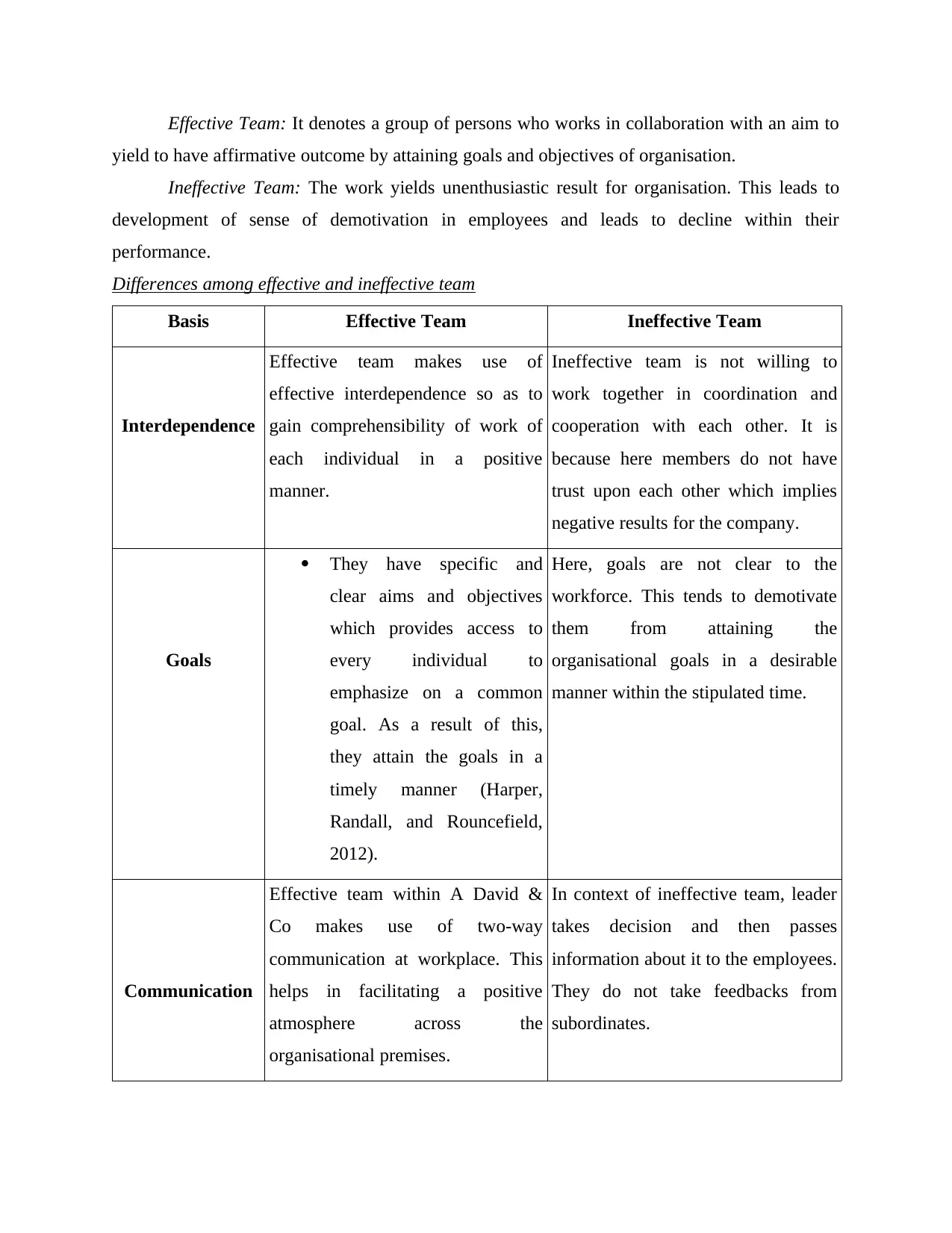
Effective Team: It denotes a group of persons who works in collaboration with an aim to
yield to have affirmative outcome by attaining goals and objectives of organisation.
Ineffective Team: The work yields unenthusiastic result for organisation. This leads to
development of sense of demotivation in employees and leads to decline within their
performance.
Differences among effective and ineffective team
Basis Effective Team Ineffective Team
Interdependence
Effective team makes use of
effective interdependence so as to
gain comprehensibility of work of
each individual in a positive
manner.
Ineffective team is not willing to
work together in coordination and
cooperation with each other. It is
because here members do not have
trust upon each other which implies
negative results for the company.
Goals
They have specific and
clear aims and objectives
which provides access to
every individual to
emphasize on a common
goal. As a result of this,
they attain the goals in a
timely manner (Harper,
Randall, and Rouncefield,
2012).
Here, goals are not clear to the
workforce. This tends to demotivate
them from attaining the
organisational goals in a desirable
manner within the stipulated time.
Communication
Effective team within A David &
Co makes use of two-way
communication at workplace. This
helps in facilitating a positive
atmosphere across the
organisational premises.
In context of ineffective team, leader
takes decision and then passes
information about it to the employees.
They do not take feedbacks from
subordinates.
yield to have affirmative outcome by attaining goals and objectives of organisation.
Ineffective Team: The work yields unenthusiastic result for organisation. This leads to
development of sense of demotivation in employees and leads to decline within their
performance.
Differences among effective and ineffective team
Basis Effective Team Ineffective Team
Interdependence
Effective team makes use of
effective interdependence so as to
gain comprehensibility of work of
each individual in a positive
manner.
Ineffective team is not willing to
work together in coordination and
cooperation with each other. It is
because here members do not have
trust upon each other which implies
negative results for the company.
Goals
They have specific and
clear aims and objectives
which provides access to
every individual to
emphasize on a common
goal. As a result of this,
they attain the goals in a
timely manner (Harper,
Randall, and Rouncefield,
2012).
Here, goals are not clear to the
workforce. This tends to demotivate
them from attaining the
organisational goals in a desirable
manner within the stipulated time.
Communication
Effective team within A David &
Co makes use of two-way
communication at workplace. This
helps in facilitating a positive
atmosphere across the
organisational premises.
In context of ineffective team, leader
takes decision and then passes
information about it to the employees.
They do not take feedbacks from
subordinates.
⊘ This is a preview!⊘
Do you want full access?
Subscribe today to unlock all pages.

Trusted by 1+ million students worldwide
1 out of 18
Related Documents
Your All-in-One AI-Powered Toolkit for Academic Success.
+13062052269
info@desklib.com
Available 24*7 on WhatsApp / Email
![[object Object]](/_next/static/media/star-bottom.7253800d.svg)
Unlock your academic potential
Copyright © 2020–2026 A2Z Services. All Rights Reserved. Developed and managed by ZUCOL.





